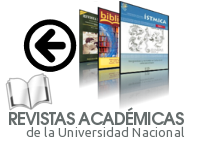Arbitration system
Peer review system
Editorial process and peer review system (evaluation)
Review and evaluation of submitted articles is carried out using the double-blind pairs method. This involves the critical and thorough review of the articles by two or three anonymous reviewers who belong to institutions other than the journal’s publishing entity — that is, are external to the Universidad Nacional. The evaluators are appointed by the Editorial Committee according to criteria of suitability, relevance and degree of specialization or knowledge of the topics covered in the articles. If a consensus is not reached between the evaluators, a third specialist is chosen who allows the tie to be broken in favor or against the publication of an article.
Therefore, the possible types of results are:
- Approved without modifications.
- Approved with modifications.
- Publication not recommended.
- Publication recommends in another journal.
The journal’s management will notify the authors of the results of reviews. If the article is accepted with modifications, 15 days will be given from the date of notification to deliver the final version. Likewise, the editor will make the pertinent form and style adjustments to the original text when it is considered necessary at any stage of the editorial process. The final decision on publication will be made by the journal’s management. The interested person will promptly be informed about the decision.
Stages of the editorial process
- Approximate total time between receipt and publication: 5 months.
Reception: all articles submitted to the Revista Perspectivas: Estudios Sociales y Educación Cívica must be original and unpublished. The article must not have been simultaneously submitted to other journals or editorial bodies. Likewise, before submitting their proposal, authors must comply with the guidelines stipulated by the journal, which include the use of APA style, 7th edition.
Once the article proposal has been sent to the email r.perspectivas@una.cr, the journal’s management will receive the document and subject it to a preliminary review in which the relevance, originality and timeliness of the topic, theoretical rigor and the use of sources of information will be assessed.
The editor will verify that the document does not contain either partially or totally plagiarized or self-plagiarized material. Likewise, he or she will carry out a preliminary review of the citation system, the copyright of the sources used and the style of the work to determine if the content complies with the guidelines stipulated by the journal. Subsequently, the editor will return the work to the journal’s management with the observations that he or she deems appropriate so that the author can incorporate them before the official reception of the article.
If the proposal complies with the guidelines , the journal’s management will distribute the article to the Editorial Committee so that it can preselect and determine if the document should be submitted to the corresponding peer review process.
Peer review: [maximum of 35 days]
- The journal’s management and the Editorial Committee will consult and select the appropriate peer reviewers for the evaluation of articles. These are specialists or scholars related to the issues under consideration whose institutional affiliation is external to the publishing entity – and who will make their final decision under conditions of anonymity of the authors.
- The reviewers will consider the submitted documents within 15 calendar days and deliver the evaluation form, as well as any observations they consider necessary. This form includes details regarding suggestions, criticism, notes and other types of remarks.
- In case of delays in the delivery of the evaluations, a reminder will be sent to those responsible via e-mail. If the delay persists without a response from the reviewers, they will be replaced immediately.
- The evaluation form will recommend one of the following outcomes: a) Approved without modifications; b) Approved with modifications; c) Publication not recommended; d) Publication recommend in another journal.
- If the result of the evaluation is in favor of the publication of an article, its authors are informed so that they may complete, sign and send to the journal e-mail the Letter granting permission for publication.
Incorporation of observations: [maximum of 15 days]
- The authors are notified of the results of the review process. If the article is accepted with modifications, 15 calendar days will be granted for the incorporation of the observations. It should be noted that the anonymity of the reviewers will also be respected when the evaluation form is delivered.
- It is essential that the authors comply with the period granted for the incorporation of modifications, since the speed of the editorial process will depend, to a great extent, on the punctuality of the parties involved.
- The authors must send the final draft of their articles to the electronic address of the journal: perspectivas@una.ac.cr.
Verification of standards: [15 days]
- The editor will carry out a final verification of compliance with the style and citation standards of the final drafts, as well as all the requirements stipulated in the journal’s guidelines.
- The editor will make the necessary adjustments to comply with the criteria and requirements of the indexes, directories, catalogs and storage and information systems to which the journal is subscribed.
- The final decision on publication will be made by the journal’s management.
Philological review and layout: [35-40 days]
- The editor will send the final drafts to the Publications and Printing Program of the Universidad Nacional for their philological review.
- The Publications Program returns the articles with philological observations to the editor, who will be in charge of incorporating said corrections.
- The issue is submitted for approval by the Editorial Board of the Editorial Universidad Nacional, EUNA.
- Once the issue is approved, the editor sends it to the Publishing Program for layout.
- The Publishing Program sends the galley proofs in PDF format to the editor for the incorporation of necessary adjustments, and in turn, it will return them as many times as necessary to the Publishing Program for additional observations. At the same time, the editor will send the proofs in PDF format to the authors with the adjustments made in the previous phases so that they can carry out a final review. Four (4) calendar days will be provided for this activity.
- After the incorporation of these observations, the editor gives his or her approval for the Publishing Program to carry out the layout in HTML and EPUB formats.
Publication: [8 days]
- Once the previous stages have been completed, the articles will be ready to be published. The editor will be in charge of the process of placing the articles on the electronic portal of the journal and make the request for the activation of the DOI – Digital Object Identifier – of each article.
- Finally, the authors will be informed of the definitive publication of their works.


_11.55_.09_a_._m_._.png)
_1.34_.01_p_._m_._2.png)
_9.45_.02_p_._m_._.png)




_2.23_.09_p_._m_._.png)
_2.35_.17_p_._m_._.png)

